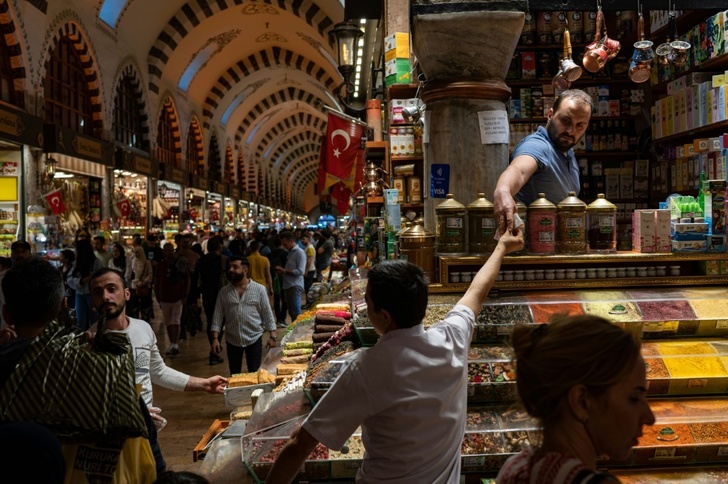Turkey's central bank on Thursday cut its policy rate for the second straight month despite an annual inflation rate that has reached 80 percent and is still moving higher.
The central bank said it was cutting its one-week repo rate to 12 percent from 13 percent and blamed skyrocketing consumer prices on external factors such as the global jump in the cost of energy and food caused by Russia's invasion of Ukraine.
The decision highlights Turkish policymakers' strong focus on economic growth nine months before a general election that polls show President Recep Tayyip Erdogan is on track to lose.
Turkey has gone the opposite direction of other central banks worldwide which have raised their rates to combat inflation, with the US Federal Reserve and European peers announcing hefty hikes this week.
The policy has put the Turkish lira under pressure, and it touched a new historic low of 18.41 against the dollar before recovering some its losses after the announcement.
Official data show Turkey's industrial production and retail sales both starting to slow.
"Since the beginning of July, leading indicators have been pointing to a slowdown in growth due to the weakening foreign demand," the central bank said.
"Leading indicators for the third quarter continue pointing to loss of momentum in economic activity due to the decreasing foreign demand."
Erdogan has openly championed economic growth at all cost.
He also rejects conventional economics and believes that inflation can be brought under control by cutting interest rates.
"I am an economist. Inflation is not an economic danger that cannot be overcome," Erdogan told US television this week.
"Currently, there are countries which feel threatened by inflation of even eight or nine percent. We have 80 percent," he said.
"And in my country, the shelves are not empty in the markets."
Turkey's inflation rate is now the highest since 1998.
- 'Managed markets' -
Erdogan's two-decade rule was built around a pledge to create a new middle-class and end the corruption and economic mismanagement that plagued successive secular governments in the 1980s and 1990s.
But his Islamic-rooted party and its hard-right nationalist allies now face the real possibility of losing their parliamentary majority in next year's polls.
Erdogan himself is expected to struggle in a likely second round runoff against any of his potential opposition rivals.
The Turkish leader has responded to the economic crisis by radically changing his foreign policy and making up with many of his former rivals in the petrodollar-rich Arab world.
Additional deals with Russia have helped shore up Turkey's dwindling foreign currency reserves and potentially given Erdogan enough breathing room to ride out the economic storm until June.
Analysts at Fitch Ratings said they expect the central bank to end its era of unconventional economics and start raising rates after the election.
But economists believe any rate hike would need to be dramatic to have any meaningful effect.
"The Turkish central bank's policy rate really has little real meaning these days, given inflation at 80 percent plus," said BlueBay Asset Management analyst Timothy Ash.
"The managed markets in Turkey are now aimed at engineering Erdogan's re-election."
zak/fo/lth
© Agence France-Presse
Your content is great. However, if any of the content contained herein violates any rights of yours, including those of copyright, please contact us immediately by e-mail at media[@]kissrpr.com.
Source: Story.KISSPR.com

